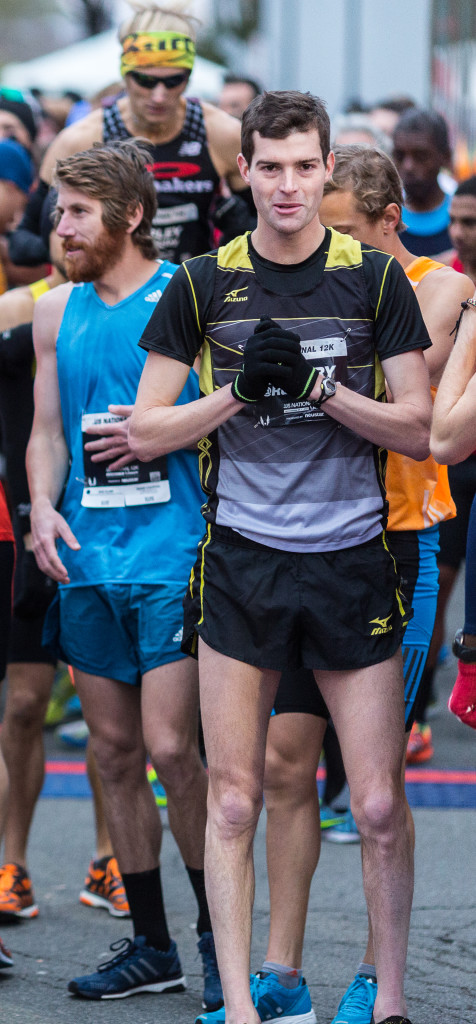
It wasn’t a bad showing. He had placed fourth at the inaugural U.S. 12k championships, the culmination of the 2013 American professional road racing circuit.
For Christo Landry, who runs professionally for Mizuno, that year included three more top-five finishes in U.S. championships, including in the marathon, held just six week earlier. But this race was special for him — because the Northern Virginia native was racing on his home turf in Alexandria. “This race exceeded all of my expectations,” he said.
You have to wonder, then: Imagine if Landry had known what was coming in the next year.
Landry races at 9:15 pm. eastern July 1. NBC is broadcasting the trials, streaming them here and RW Advanced is live tweeting the 10k.
Imagine he knew, in April, he would return back to this place he still calls “home” for the Cherry Blossom Ten Mile Run, another national championship, and – as he would take the lead among Americans – hear spectators say things like: “Wait a minute, was that? Go Christo!”
Yes it was. The tall, lanky kid who led the Thomas Jefferson High School for Science and Technology to a state cross country title was performing on the big stage.
The race organizers planned to have separate tapes at the finish line for the American and overall winners, unless there was a sprint finish. In the last mile, wanting to capture his first national title in style, Landry let an East African he’d been running stride-for-stride with zoom ahead of him so the tape would be there.
At the next national championship, a month after Cherry Blossom, Landry tied the American record for 25k. After the race he drove back to Ann Arbor, Mich., so giddy, so pumped beyond belief, that he belted out whatever classic rock tune came over the radio. And in the morning, after only a few hours of sleep, he reported for drug testing, confirming that USATF rules do actually allow for professional runners to experience a very rare night out on the town.
Then it would be Independence Day, and Landry would be in Atlanta for the Peachtree Road Race, host of the national 10k championships.
Coasting into the lead, he’d think to himself: ‘Are we going that fast? Because I’m feeling good.’
Imagine, in Alexandria that day, if Landry had known that the slow-but-steady success of his first three years on the national road racing scene was fast approaching a tipping point.
Three national titles in one year.
***
About a year later, the day before the second running of the 12k championships, we had lunch at the Railstop Gastropub, at the Crowne Plaza hotel in Old Town Alexandria. I was concerned, for Landry, that the menu only seemed to offer items like burgers covered with fried eggs. “This is fine,” he assured me.
At 6 feet 1 inch, Landry is on the taller side among professional runners. I’ve seen many lean, hungry-looking runners sport dark shadows under their eyes during periods of hard training, but Landry’s look more like tattoos. His training log, as it happens, is full of 130- and 150-mile weeks and marathon-length-and-longer long runs.
As for his personality, Landry — and I agree with his coaches and friends on this point — is the following in roughly equal parts: pure jokester; the most serious person you’ll ever meet; and hyper-logical all the way through.
He was drawn to running “because I was good at it,” he said. “That’s what started me at it. I’m a very competitive person, and you can’t be competitive in every aspect of life — that’s just not how the world works. So you pick and choose your spots, and running was the sport I chose.”
His 2014 breakthrough, he said, was no mystery, either.
In high school and at the College of William and Mary, Landry was injured about as often as he was healthy. Rather than build fitness year by year, he would get injured, cross train like an animal, complete a crash course in training, repeat.
This didn’t stop Landry, now 28, from leading TJ to a state title. It didn’t stop him from becoming an All-American in college, either.
But it always left him wondering … What if I could just stay healthy?
For all of the high points of 2014, though, Landry, when we met, was also bouncing back both physically and psychologically from his last race, the Chicago Marathon, where he was 13th in a disappointing personal best of 2:14:30.
Making matters brighter, Landry’s second USARC Running Circuit title was officially in the bag. Regardless of how he did in the 12k – regardless of if he even finished – he would receive a $25,000 check for winning the series.
His goal for the 12k, he said, was “to go out there, compete, see what happens – anything I do is icing on cake.”
***
Landry comes from what he describes as an “athletic family.” His mother ran track. His dad played basketball and volleyball. His brother, to give you an idea of the endurance genes that run in this family, ran about 9:15 for two miles even though he could only train every other day.
After setting a kindergarten record for the mile in nine-plus minutes, Landry first went out for cross country in middle school at Falls Church City Public Schools.
But he liked soccer — a spring sport in Virginia. And while that at least opened up the door for high school cross country, the freshman-year Landry signed up for golf instead. When winter came around, he went out for indoor track, only to get in shape for soccer.
After flunking out of 500 meters, he turned to longer distances, breaking five minutes on a slow track.
“I don’t think I ever had a kid do that; it’s pretty rare,” said Matt Ryan, who coached cross country and track at Thomas Jefferson from 1997 to 2009.
There was no big speech needed to convince Landry to skip soccer and set aside his golf clubs. Landry got the message on his own.
“By the end of my freshman year outdoors,” he said, “I was running 4:30 for the mile and figured, ‘Yeah, I should stick with this.’”
It was the early 2000s, and the Northern Virginia high school scene, with runners like Alan Webb, who would become the fastest miler in American history, was experiencing something of a renaissance.
This also was true, in a sense, of TJ, a state magnet school that grooms its students for careers in science, math, and technology.
The 2002 team, which would win a state title, included a junior-year Landry; Keith Bechtol, who was a year older than Landry and would also go to William and Mary; Chris Mocko, who would run at Stanford; and Brian Hanak, who would run at Yale.
“My comment usually about the ‘02 team,” Ryan said, “is that my daughter could have coached them to a state championship.”
Landry considered Bechtol and others in the class above him as his mentors, he said.
“Keith,” Ryan said, “was very much the taskmaster; Christo was more of an extrovert.”
“There was an understanding,” said Bechtol, “that to win a state championship as a team, we needed team depth, and all the training and workouts were geared towards that effort.”
To that end, the team not only trained together – “we started doing everything together,” Mocko said. “We went to summer camp together, trained together in the off-season … shared pre-race meals together — we were around each other all the time.”
School. Practice. Dinner and homework. Sleep. “That was pretty much what I did,” Landry said.
Ryan added: “[Landry] may have been slightly underdeveloped physically, but mentally I was probably having conversations with him in the spring of his senior year” – while he was establishing himself as one of the top prep runners in the country – “that a college coach would be happy to have with a senior at that level.”
Bechtol, by the way, is now an astrophysicist searching for the highest energy particles in the universe.
He’s also run 2:16 in the marathon.
***
Landry struggled in the transition to college running. “I was getting my butt kicked,” he said.
In his freshman cross country season, while most of his William and Mary teammates raced at NCAA Pre-Nationals, Landry raced a home invitational meet.
He finished second, earning a spot on the conference team. There, Landry, again, finished second, earning himself a spot on the team for regionals.
At regionals, Landry finished seventh and qualified for the NCAA nationals. At nationals, Landry made All-American.
Fast forward to his senior season, when Landry was able to improve upon that result.
But much of the time in between was frustrating, he said. “I basically found a way to get hurt every winter.”
In his fifth year, Landry earned a master’s degree in accounting. In his sixth year he completed a year towards a Master’s in Business Administration. That winter, he of course got injured.
“I said, ‘This can’t be it, there’s more left. I know I am better than this.”
Then-Tribe coach Alex Gibby seemed to know it, too
“I wouldn’t call it a do-over,” he said, of the opportunity to coach Landry after college, “but it was nice to get some extended time with him to correct some of the things that weren’t identified early.”
Landry planned to stay in Williamsburg. But when Gibby took a job at the University of Michigan, Landry followed him there.
“That turned out to be a lifesaver for me,” Landry said. “Moving up there, setting new rhythms – it’s where the [weights staff] figured out what had been ailing my knees for the past few years: my hips were out of alignment.”
“Knock on wood,” he added, “but it’s been four years now and you can see the results. Every year you are building on the past instead of starting from scratch every year.”
***
In the 2014 12k, Landry finished eighth in a more competitive field. For winning the series, Landry was not only given a check, but a big trophy-slash-road sign that he held up proudly and more than once described as sweeeet.
A month later, Landry was named the USATF men’s long distance runner of the year. That same month, American runner Mo Trafeh received a four-year doping sanction and had to forfeit all of his results after January 1, 2012.
Landry, we would learn, did not win his first national title in Washington, D.C., or tie an American record for 25k. Because of Trafeh’s disqualifications, Landry won his first national title in 2012, at 15k in Jacksonville, Fla., and the American record is now all his.
On Dec. 19, Landry would tweet: “Glad that the cheat is being removed from the books. There is no place [for] drugs in our sport. Next step: stopping EPO users in routine testing.”
Landry’s drug, it seems, is not getting injured. The question is: How far can he go if he stays on it?
When Gibby took a new job in Charlotte, N.C., Landry upped and moved again, setting them for up an 11th year that’s all part of a long drive towards making an Olympic team in either the marathon or 10k.
Landry’s sweet spot — his results will tell you — is somewhere in the middle of those distances.
Gibby, however, believes — though “it’s probably two or three steps ahead of him” — that Landry will have his greatest success in the marathon.
“I think for young distance runners,” he added, talking about Landry’s focus and drive, “if they don’t understand it’s a long-term commitment, I think they’re missing the point.”
This article originally appeared in the Spring 2015 issue of RunWashington.
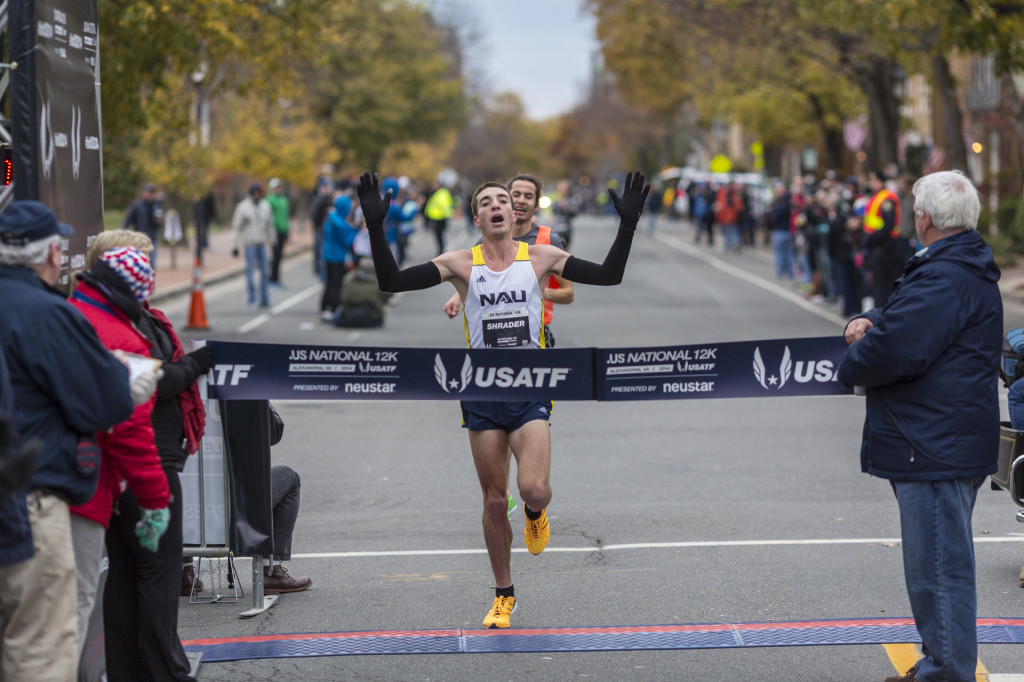
The word Brian Shrader kept saying over and over – to reporters, to friends, to race organizers, and to new fans seeking his autograph – was “shock.”
For example: “I’m still in shock,” he said, after winning the .US National 12k championship in Alexandria this morning. “I don’t even know what to think.”
[button-red url=”http://www.national12k.us/Results.aspx” target=”_self” position=”left”] Results [/button-red]
There were a number of reasons Shrader felt this way.
For one, the top prize paid out $20,000, but the 23-year-old still has track eligibility left at Northern Arizona University. So unless he wants to turn professional, Shrader, according to NCAA rules, can only accept prize money “in an amount up to actual and necessary expenses for the calendar year.” (See this Collegiate Running Association page for a more detailed explanation, but he could keep as much as he can document with receipts, including costs for travel, equipment and coaching.)
Before today, Shrader had never run a 10k, let alone a 12k. He had only run one other road race: the CVS Downtown 5k, the national championship, in September, where he was 4th in 13:59.
Shrader racing the 5k was Northern Arizona University alum Diego Estrada‘s idea. They both live, and occasionally train together, in Flagstaff, Ariz. That day, Estrada unleashed a strong kick to win his first national title, while Shrader qualified to have his expenses covered to compete in the 12k.
On a cold, overcast morning, Shrader, Estrada, and 22 other elite men started around 7:25 on S. Union Street, near Oronoco Bay Park. They headed south to Franklin Street and made a short climb and descent. There, not long after the mile mark, they turned left onto George Washington Parkway, which they followed out to the halfway mark, where they did a U-turn and retraced the same route.
Last year, Aaron Braun, of Alamosa, Colo., came here hungry to win his first national title, setting the tempo for a big lead pack and throwing in a series of surges that allowed him to gradually slip away. He broke the tape in a time of 34:26, which he found out later was just two seconds slower than Steve Spence’s American record.
At yesterday’s press conference, Braun said he was just as fit, if not more fit, than he was in 2013, but also knew he’d have more of a “target on his back.”
That turned out to be true.
In the opening mile, a huge pack, 20-plus strong, formed around him. The consensus, it seemed, was that Braun would be the one pushing the pace while everyone else would be the ones trying not to get dropped.
As 4:40s in the early miles dipped down closer to 4:30 by halfway, the pack started to string out. After the U-turn, Braun threw in a 4:25, his goal being, as with his earlier and later surges, to “try and hurt people a little but also not hurt myself.”
“I needed to be able to put them away earlier,” Braun said, “and make them think it was too big of a gap.”
But back on S. Union Street, when the finish line came into view, Braun, though he had successfully dropped most of the field, was still flanked by five other runners – Shrader, Estrada, Jared Ward, Girma Mecheso, and Parker Stinson – who were snapping out of survival mode and tapping into a far more positive notion: I can win this thing.
Shrader, wearing his NAU singlet, had been executing his strategy of keying off Estrada, hanging on to the lead pack as long as he could, and waiting to see what he had in the end. In the final miles, he tucked closely behind Braun. The last 200 to 300 meters, for him, and for everyone involved, was a blur.
Shrader took the lead; and when his legs tied up, 50 meters or so before the finish, he expected to get caught, but no one came. He won in 34:11, averaging 4:35 per mile, as all six in the final chase pack dipped under what used to be Spence’s American-record time.
Estrada, who had given Shrader the idea to test out road racing, and who missed training time recently due to a sinus infection, was just a second back in 2nd. He said the race played out as he expected.
“I assumed Aaron would push the pace, which happened. And then I figured there would be a few guys with a mile to go; then of course everyone would charge again … But I hesitated a little bit. I wasn’t quite feeling it, and it cost me at the end because I ran out of room,” he said.
Braun, just three seconds back, returned to the podium. “My goal, he said, “was to come back and get the title, number one, and get the record for number two. I got number two, but not number one.”
Mecheso, 5th, gave Braun credit: “The way he ran, he deserved to win,” he said, “because he was pushing all the way.”
Stinson, two seconds behind Mecheso, was inspired by the result, calling it “one of my best races.” Like Shrader, he still has track eligibility, though at University of Oregon.
On one hand, he would’ve liked to have been more competitive during the sprint finish. On the other, he doesn’t envy Shrader.
“I’m glad I didn’t make too much money,” he said, “so I don’t have to make any decisions.”
***
Falls Church native Christo Landry knew his odds of winning his fourth national title in 2014 weren’t good. Five weeks ago he finished 13th in a new personal best of 2:14:30 at the Chicago Marathon, and was still feeling its effects. “I just don’t have the top-end gears right now, coming off the marathon,” he said after finishing 8th in 34:42. “And when you get dropped running 4:35, right after running a 4:32, [you know] they’re running a great time. They ran great, and I just wasn’t hanging with them today.”
For Landry, through, today’s 12k was also a way to celebrate a breakthrough 2014 that gave him an insurmountable lead in the USA Running Circuit (USARC) standings. After the top 10 men were announced, Landry was awarded the $25,000 overall USARC title. He had 82 points, 31 more than Estrada in second.
In the masters division, Arlington’s Michael Wardian won a national title in 38:32. Philippe Rolly, of McLean, was second.
“I don’t ever try to just look to win the masters, but it’s exciting to be in a new age group,” Wardian said.
In typical Wardian fashion, the ultra runner and marathoner was in the Bahamas earlier in the weekend getting in some heat training, he said, and on Friday will represent Team USA at the World 100k championships in Quatar.
“Our team is completely stacked,” he said, “so I think we should win the team title.”
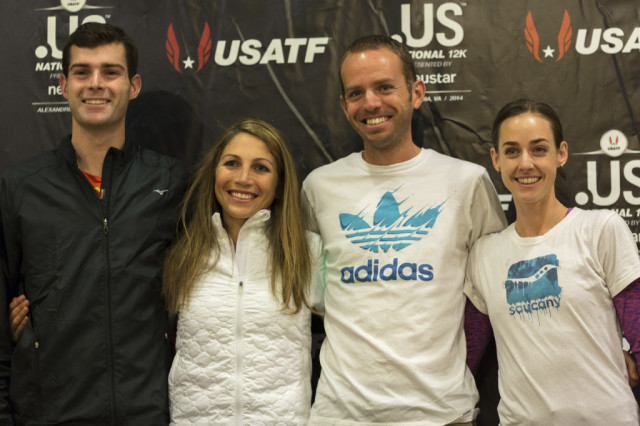
For the second year, the .US National 12K championships will be held in Alexandria, capping off the 2014 USA Running Circuit (USARC).
How it works: The USARC each year hosts national championships at distances ranging from one mile to the marathon. The first 10 U.S. runners at each race earn points, and also qualify for the 12K, which features $100,000 in prize money. Points are doubled at both the 12K and in the marathon.
***
Heading into tomorrow, Falls Church native Christo Landry, with 76 points, has an insurmountable lead in the men’s standing. Landry is entered; Tyler Pennel, second in the USARC standings, is not.
Pennel established himself on the national stage at last year’s 12k, finishing 3rd. In October, he won his first national title in his debut marathon.
For Landry, 2014 has been nothing less than a breakthrough year. In April, he won his first of three national championships on his home turf at the Cherry Blossom Ten Mile Run, prior to capturing titles at 10K and 25K. Five weeks ago, Landry was 13th in 2:14:30 at the Chicago Marathon. The result disappointed him.
Tomorrow, though, Landry, a graduate of Thomas Jefferson Science and Technology then William & Mary, who recently moved from Michigan to Charlotte, N.C., will give it his best shot, and, no matter the result, claim a USARC title and savor the opportunity to race in northern Virginia. “It’s just great to come home,” he said. “I grew up right nearby and anytime I get to come back to this area it just feels like coming home again, regardless of where I live at the moment.”
During a press conference today, Kevin Ullman of RunnerSpace pointed out that Landry and Molly Huddle have a shot at becoming the first runners to ever claim four USA titles in one year.
Landry, after noting how special that would be, said, “It’s more likely to be Molly’s chance to do it first than mine tomorrow.”
Huddle, the defending 12k champion and clear favorite, is just two points behind Sara Hall in the women’s USARC standings. Both will race tomorrow.
“That’s a pretty detailed stat,” said the understated Huddle, to Ullman’s question, “but I think it would be pretty special [to win four titles].”
Huddle has raced three USARC races and won as many times, claiming titles at 7 miles, 20K, and 5K. Last year, for Huddle, 12k, as a distance, seemed both strange and too long, even if she covered it in a national record time. This year, though, Huddle said she has a good “pace memory” for the distance and is focusing on winning a national championship. “Hopefully however fast we have to go I’m ready to do that,” she said.
Hall, throughout her career, has had tremendous success in the middle distances on the track, but said she has had fun – not to mention success – experimenting with longer distances this year. She was the second American finisher at the Cherry Blossom Ten Mile Run, which hosted the national championship, and won and set a course record at the EQT Pittsburgh 10 Miler last weekend.
Had it not been for a burst appendix in August, Hall, who is married to American marathoner Ryan Hall, planned to run her debut marathon earlier this fall. That plan has simply been postponed.
“After this race I’ll probably be turning the corner to more marathon specific training,” she said.
***
After many near misses, Aaron Braun won his first national title at last year’s 12k, “getting over the mountain,” he said.
Braun added: “Once I know that I’ve done something once, then I have a lot more belief that I can do it again.”
Braun’s 2014 has been up and down. His debut marathon didn’t go well. And in July, Braun, feeling overly fatigued, took a long break to recharge.
But Braun has since won the Great Cow Harbor 10K and San Jose Rock ‘n’ Roll Half Marathon, and is now focused on defending his 20K title. “I feel like I’m in as good of shape, if not better shape, than last year, so I should be able to pull it off again this year,” he said.
Believing gait inefficiencies contributed to his difficulties in the marathon, Braun worked on his form, starting with a visit to Mark Plaatjes, a former world marathon champion and physical therapist, for video analysis.
“As soon as I watched the video, I was kind of like, ‘Oh, gosh, that’s pretty bad.’ You always feel like you are the most beautiful runner, but when you actually see, actually critique yourself, it was kind of a good view into what was actually happening,” he said.
Braun has been doing strengthening drills and has been more conscientious of not leaning too far back while running.
“Hopefully it pays off tomorrow and in my future marathons,” he said.
***
A USATF spokeswoman said 1,300 runners will participate in tomorrow’s race. It will be run on a different, and out-and-back, course, but will start and finish in the same place, near Oronaco Bay Park. (See map.)
The elite women will start at 7:15 a.m. The elite men, masters, and open race will start at 7:25. To watch online, see the live stream.
Lucas Meyer, a lawyer living in Washington, D.C., is in the men’s elite field. See both elite fields.
RunWashington will cover both the elite men’s and women’s races. Follow @runwashington and @dicksonmercer for updates.
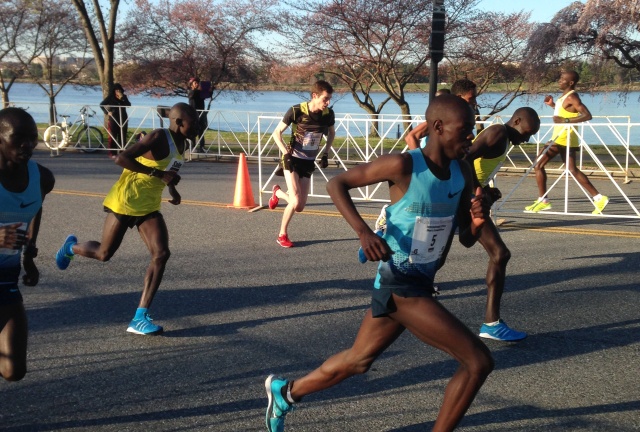
Chasing Greg Meyer’s American record put Christo Landry in contention at the Cherry Blossom Ten Mile, and though he fell short of the 46:13 standard, the Falls Church native came away with his first national championship in 46:41. His finish put him sixth overall.
Now a professional runner for Mizuno living in Ann Arbor, he came home to the D.C. area to tune up for the 10k at the Peyton Jordan invitational next month at Stanford University and ended up lobbing off a chunk from his previous 10 mile time, a racing distance of relative obscurity away from the east coast.
[button-red url=”http://www.runwashington.com/wp-content/uploads/2014/04/CB-2014.pdf” target=”_self” position=”left”] Results [/button-red]“That American record was within reach,” he said. “If I had just had someone to push the pace and hang onto the last three miles…I would have just had to run 4:40 miles, which was slower than I was going, but I was doing a lot of leading into the wind. I’m really happy to get the overall American win.”
He ran at William and Mary following a high school career at Thomas Jefferson Science and Technology.
“Just landing and seeing the metro, I was like, ‘I’m home!’” I heard ‘go Christo’ a lot. With a name like that, you know they’re yelling for you and not a ‘Chris’ or ‘Christopher.’”
His parents moved to Seattle years ago, but he still has an aunt and uncle in Capitol Hill.
Ahead of him, Stephen Sambu improved from his fourth place finish last year to edge defending champion Daniel Salel, both timed at 45:29.It was the second consecutive year two Kenyans finished in the same time at the front of the race. In 2013, Salel outleaned Allan Kirprono. Kiprono finished third this year in 45:47.
“It was a tough race,” Sambu said. “Really, really tough, from the start, people were hammering.”
He had a slight advantage with 300 meters to go, marked by a sign with the distance left in the race that Sambu was thankful to see, despite having run the race twice before.
“I didn’t have to guess how much we had left, I knew I could pull it off,” he said. “I knew he had a good kick, but in the middle of the race, if I still feel good, I knew I could do it.”
The course, now in its sixth year of the current layout, played to his strengths.
“Perfect flat, not too many hills, and no wind,” he said. “Last year was tough.”
His improvement between the two races, 90 seconds, was a testament to the improved conditions, and Sambu’s improvement. Salel’s time was 37 seconds faster than last year.
Sambu ran at the University of Arizona and lives in Tuscon.
Matt Tegenkamp, of Portland, was the second American until roughly 1200 meters remained, when his calf seized up and he struggled to the finish line in 15th place, the fifth American. He ran the 5k at the 2008 Olympics and the 10k in 2012.
“It was a pretty crazy race,” he said. “The first mile was pretty tame, then things picked up in the second mile, then three to five was just crazy fast. I was just trying to fight the war of attrition, find a comfortable rhythm and I did around 10k. Then there were enough guys blowing up from the early pace that they were coming back.”
That worked, up until close to the end.
“I spent three miles catching up to Girma (Mecheso) then after mile nine, my calf went bad and (Mecheso and) three other Americans (Mo Trafeh, Ben Bruce and frequent Cherry Blossom runner Tim Young of Fredericksburg) passed me.”
After his first go-round at Cherry Blossom, Tegenkamp came away with an observation about the course. “To compete well in this race, you have to be in track shape,” he said. “I wasn’t there and I could tell. It’s really a race where you feel like you’re on a track.”
Luke Meyer, three years ago the top U.S. finisher, lead the local running contingent, finishing 20th in 48:45 and 10th in the U.S. championship race, a mere 19 seconds slower than when he was training in law sch0ol.
U.S 10 Mile Championships (gun times)
1. Christo Landry 46:41
2. Girma Mecheso 47:22
3. Mo Trafeh 47:27
4. Ben Bruce 47:33
5. Tim Young 47:45
6. Matt Tegenkamp 47:57
7. Joe Gray 48:04
8. Tyler McCandless 48:21
9. Ian Burrell 48:42
10. Luke Meyer 48:46
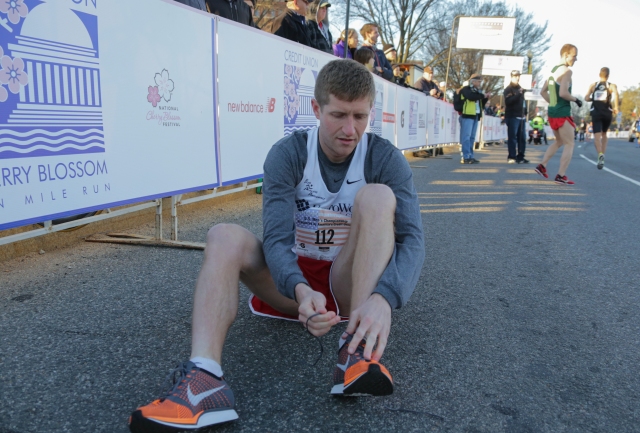
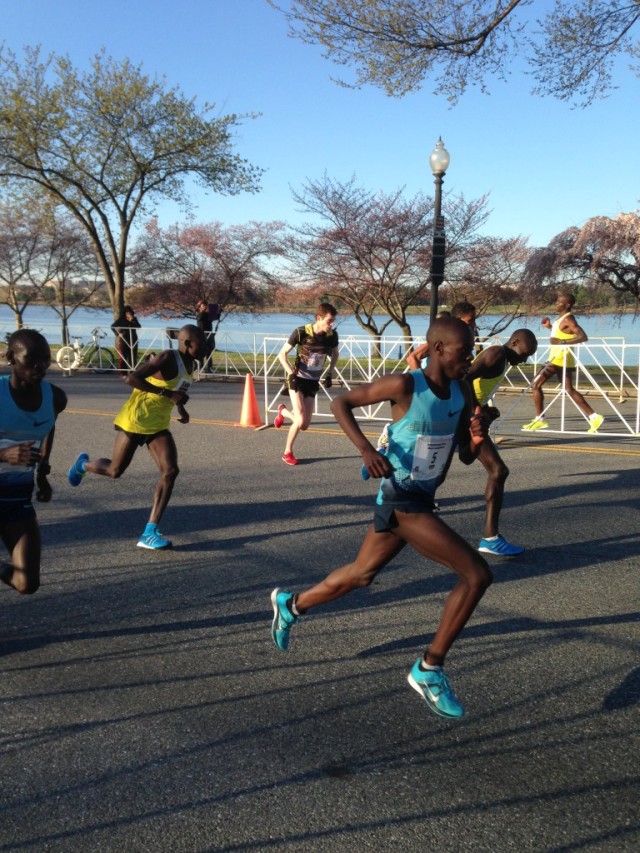
Editor’s note: These are outtakes from our profile of Christo Landry that appeared in the Spring 2015 issue of RunWashington.
On choosing golf over cross country as a high school freshman: “It was my grandpa. I just played golf with him whenever I saw him growing up. I still have fun playing when it’s warm outside. I’m not necessarily very good, but I’m also not a complete disaster on the course.”
On Thomas Jefferson High School for Science and Technology’s success in ‘mental sports’: In football “my first year we were playing Centerville for our homecoming and we had signs that said we will not lose … by more than 50. We lost 49-0. The score of all score of all three games – varsity, JV, freshman – was 106-0. Needless to say, that wasn’t our strong spot, neither was basketball.”
On injury troubles that weren’t always because of running: Like the time at the College of William and Mary that he lost control of his bike while riding to class. “Rather than bail out into some bushes … I ended up smashing my knee into the building and bruising a nerve.” Landry missed nine weeks.
On what it meant, in 2006, to have an A team finish 8th at NCAAs and a B team win the IC4A Championship in cross country. “Oh, man, there were some parties when we got back.”
On not partying: “I was really boring in college. I didn’t drink until I was 21. It was just kind of a personal thing – it’s like, let see if you can do that. Then, after I turned 21, I was always injured, so it’s like, I’m not going to drink because that’s going to slow down my recovery. So I never really went out and partied. And as far as the team as a whole, we didn’t really drink much during the season, because we wanted to be good. Now, granted, the two weeks we had off after the season, I’m not sure if some people were sober at all during that time. So that was always fun to watch.”
On his “vice”: “I’d say my biggest vice was just staying up too late – maybe staying up until 12, 1 a.m. in the morning. Granted, I didn’t have class until noon, so I didn’t have to get up until 11, so I’d get my 10 hours, just not at the right time for your body to recover optimally. It’s still my biggest problem: just making sure I consistently get to bed early. So now I am trying to make sure I get to bed by 10, which I’ll slip up on one or two days a week.
On his first year as a professional running: In March, 2011, Landry ran 14:20 in the 5,000 at the Raleigh Relays (he ran faster as a college freshman). At Mt. Sac he ran 14:10. “So I go to Payton Jordan at Stanford, I’m running the 10k, and going there I’m like, ‘Well, shoot, I’ve done this for almost a year now post-collegiately. If I don’t race something decent here, alright, I’m done. I no longer have it.’ And I got in that race and ended up splitting 14:20 for my first 5k and 14:10 for my second 10K, running 28:30 in my first 10k. And I’m like, ‘Alright, ok, we’re good; we can keep going at that point.’”
On discovering the roads a month later: Landry entered the 8k national championships in Carmel, Ind., winning $2,000 for 4th place. “I didn’t know any better. I just drove down there, booked my own hotel, just drove over to the start of the race at the beginning. I didn’t know anything about them putting you up, race hotels, anything about that.” At Peachtree the next month Landry’s room was comped. “The race hotel is the Ritz. Compared to me booking a $40 a night hotel, it’s like, ‘I don’t know what most road races are like, but I do know which end of the scale I want to be on.'”
On gradual success on the roads: “I started those [national championship] races and I was finishing in the four to eighth range – and you know, gradually every year I have worked my way up.”
On long long runs: “When you get used to running 2:20 in training, when you move up to the marathon, if you want your body to adjust, naturally you have to run further.” Prior to the Chicago Marathon last year, Landry did a three-hour run on a six-mile stretch of road, covering 32 miles. “I felt fantastic after that long run. I mean, I probably ate a whole bag of tortilla chips afterward – get some salt back in my body. … But I felt great.”
On his Olympic dream: In 2008, Landry, still in college, and hurt at the time, watched the U.S. Olympic track trials in Eugene. “I made a promise to myself I would be participating in the next one, and sure enough I was. I managed to get myself tripped and fall flat on my face in the 10k; not the best way to run that. The television cut out beforehand, so everyone just saw the bad time and the bad place. There I made the promise to myself I will make the Olympic team next time it comes around.”
On his plan to make the 2016 Olympic team: “Well, hopefully I’ll have two shots at that, and need only one.” This spring he’ll focus on getting an A standard qualifying time for 10,000 meters. In August, Landry will transition to training for the marathon trials. This way, if he doesn’t qualify in the marathon, “then I have a shot to come back and prepare for the 10k trials. And if I have the A standard out of the way, I don’t have to peak at Payton Jordan to get the standard there and then compete at the trials as well, which is very difficult.”

